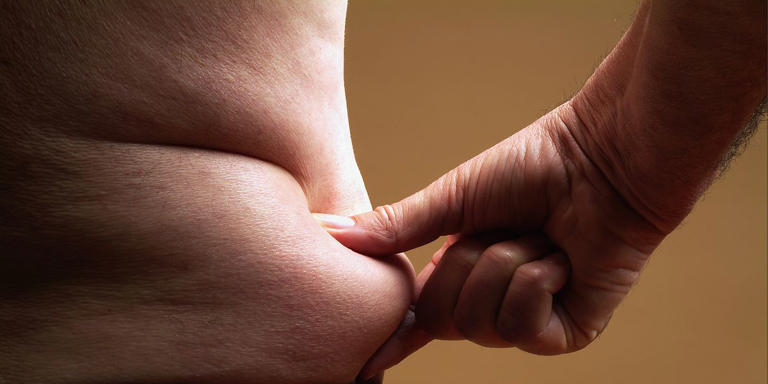How to Tighten Your Loose Skin After Weight Loss

















How to Tighten Your Loose Skin After Weight Loss
THE OUTCOMES OF weight loss are usually warm-welcomed: your energy levels are higher, your athleticism has improved, and you're likely feeling generally healthier (not to mention more confident). There's one small side effect of losing weight that's often forgotten about, though, and might be a little less welcome: loose skin.
Our skin is the largest organ of the body, and it's the first line of defence for our immune system, provides insulation, and keeps everything in place. It's an incredibly resilient organ, and mends to whatever changes our bodies go through. As you gain weight, your skin stretches out to cover the new surface area.
Unfortunately, though, it's a bit less apt at doing the opposite – shrinking when that mass is lost. If you've undergone substantial weight loss recently, your loose skin may be clouding the achievements you've worked so hard for, which can be frustrating. There are a few ways to relieve that problem, though—some you can do with the help of a physician, and some you can do on your own.
You deserve to feel confident and comfortable in your own skin, regardless of your size. Here's the lowdown on how to make that happen when you're struggling with extra loose skin after weight loss.
Why Does Loose Skin After Weight Loss Happen?
According to Jordan Jacobs, M.D., an assistant professor of plastic and reconstructive surgery at Mount Sinai Hospital in New York, loose skin is usually caused by the following:
Rapid Weight Loss
Loose skin due to rapid weight loss is usually seen in people who undergo bariatric surgery for large amounts of weight loss (more than 100 pounds). About 70 percent of people who undergo this procedure are left with excess skin. "Losing weight rapidly doesn't give our skin adequate time to gradually contract and this results in loose, hanging skin," says Dr. Jacobs.
So who can expect loose skin after weight loss? While it varies, mild weight loss (think: 20 pounds or less) typically doesn’t lead to excess skin, explains Joshua Zuckerman, M.D., surgical director at New York City-based Zuckerman Plastic Surgery. When it comes to problems with loose skin, a weight loss of 40 to 50 pounds can seem as big as a weight loss of 100+ pounds.
Gradual Weight Gain
Loose skin post-weight loss is also a product of the weight gain itself. "Skin has a finite elasticity, and if pushed beyond the limit of that elasticity upon weight gain, the skin cannot fully contract back down upon subsequent weight loss," Dr. Zuckerman says.
Ageing Skin
With age, one loses the elasticity needed for loose skin to "snap" back after most weight loss. This leads to loose, wrinkled, and sagging skin, says Jaimie DeRosa, M.D., a double board-certified facial plastic surgeon and founder and lead facial plastic surgeon of DeRosa Center Plastic Surgery & Med Spa in Boston and Palm Beach.
That's why loose skin isn't just about how much weight you lose. Your age and skin quality also determine whether or not you’ll experience loose skin after weight loss, he says. Younger people have a better chance at avoiding excess skin than older ones; so do people with inherently high skin elasticity. (As you age, the elastic fibers and collagen molecules that give your skin its firmness lose their strength.)
Men also tend to do better in their arms and legs than women do, notes Jeffrey M. Kenkel, M.D., a professor and chair of the Betty and Warren Woodward Chair in Plastic and Reconstructive Surgery at UT Southwestern Medical Center.
How Can You Get Rid of Loose Skin After Weight Loss?
According to Dr. Jacobs, here are some options for tightening your skin after weight loss:
Surgical Removal
For significant weight loss (usually around 70 to 100 pounds), the amount of loose skin will be really hard to remove non-surgically, Dr. DeRosa says. But there are tightening procedures that work and remove excess skin in a way that the scars are in inconspicuous places, such as the pant line or underarms.
Body Contouring
Patients can also turn to contouring procedures such as BodyTite and FaceTite (which can be used in conjunction with liposuction) to remove fat and tighten skin. Just be aware that these treatments may not fully address the problem unless you have a mile case of excess skin, Dr. Zuckerman notes.
Slower Weight Loss
While it’s not always an option (especially for those who have had bariatric surgery), gradual weight loss seems to be the best for preventing loose skin in the first place, notes Dr. Jacobs.
Exercise
Building muscle – by way of a solid exercise regimen with strength training work—is always a good idea. Plus, it can make your skin look more taut, says Holly Wyatt, M.D., professor of medicine at the University of Colorado.
In short, surgical excision (though it comes with a longer recovery) remains the gold standard, says Dr. Jacobs (and produces “profound” effects) and the results from the more minimally-invasive treatments are what you would expect: subtle, he says.
Can Loose Skin After Weight Loss Go Away on Its Own?
Not really, docs say – though remember, how much excess skin you’re left with and how well your skin responds to weight loss in the first place depends on everything from age and genetics to how much weight you lost and your skin quality. So, depending on your circumstance, you might be able to expect some changes.
"Patients who may see improvement in their loose skin are those who do not have stretch marks and younger patients who still have reasonable skin quality despite weight gain," says Dr. Kenkel. "The quality of the skin is the key to improvement."
Dr. Jacobs also suggests that if you’ve lost weight gradually to give your skin a full year to contract once you’ve reached your goal weight. "After this time, you are not going to see any more noticeable tightening."
Then, if you have loose skin you’re concerned about – or if you have loose skin after bariatric surgery – do your homework and get in touch with a plastic surgeon certified by the American Board of Plastic Surgery to learn about your options, suggests Dr. Jacobs. "There are a lot of physicians that label themselves as 'plastic surgeons' and, as long as they have a valid medical license, they can legally perform any procedure," he says. "But the American Board of Plastic Surgery denotes the proper training."
What Is the Best Home Remedy to Tighten Your Skin?
There’s no magic skin tightening cream or exercise that’s going to really noticeably tighten loose skin after weight loss on its own. That’s what makes excess skin a difficult problem for those with more moderate cases, says Dr. Zuckerman. “If one has lost a moderate amount of weight, you may find that treatments to add collagen and elastin back into the loose skin may help tighten it,” adds Dr. DeRosa. “This can include some skin care products as well as ultrasound and/or radiofrequency-based treatments.” OTC products like cocoa-butter sound like a good idea, but tend to have subtle results, at best.
The best home remedy, then? "Taking care of your skin," says Dr. Jacobs. "This includes sun protection, avoiding smoking, limiting alcohol consumption, and eating a diet rich in fruits and vegetables and low in sugar and saturated fats."
Articles-Latest
- 8 common mistakes that could be making your dry lips worse
- Dermatologist's insight on shower frequency without harming skin
- ‘Making Black More Beautiful’: Black Women and the Cosmetics Industry in the Post-Civil Rights Era
- A damaged skin barrier can leave you dry, itchy or oily. So, how do you fix it?
- What is collagen and why is it so popular in the beauty industry?
- Skin icing's not just for summer – this cryotherapy technique will get you party season ready
- How much sunscreen should you use and how often do you need to apply it?
- Are AHAs Safe?
- EXFOLIANTS - Cosmetics Unmasked
- ASTHMA - Toxic Beauty
- PHOTOSENSITIVITY - Toxic Beauty
- How to Tighten Your Loose Skin After Weight Loss
- Everything You Need To Know Before Getting A Septum Piercing
- What you should know about treating rosacea in darker skin tones
- Shampoos and Conditioners Designed to Soothe Dry, Itchy Scalps
- 3 things an expert wants you to know before getting filler
- Dissolving filler: everything you need to know
- How thread lifts differ to facelifts – and filler injections
- People are using face tape to minimise wrinkles, but does it work? After asking a plastic surgeon, I tried it for myself
- Reality of Black beauty influencing - making foundation with eyeshadow and unequal pay
Cosmetic ingredients
LOGIN
Who's On Line
We have 37 guests and no members online
Articles-Most Read
- Home
- Leucidal
- White Bees Wax
- Cosmetic Preservatives A-Z
- Caprylyl Glycol
- Cosmetics Unmasked - How Safe Are Colorants?
- Cosmetics Unmasked - Choosing Ingredients
- Cosmetics Unmasked - Colorants And Fragrances
- EcoSilk
- Toxic Beauty - Who's Looking At Cosmetics?
- Cosmetics Unmasked - Fragrances
- Microbes and Cosmetics
- Chemicals Lingering In The Environment
- Microbes and Safety Standards
- Toxic Beauty - Hazardous To Your Health
- Potassium Sorbate
- Yellow Bees Wax
- Synthetics In Cosmetics - The Industry Fights Back
- Fresh Goat's Milk Soap
- Active Ingredients
- What's Happening in the USA - Cosmetic Regulations - Toxic Beauty
- Cosmetics Unmasked - Listing Cosmetics
- Natural Waxes A-Z
- Toxic Beauty - Cocktails and Low Doses
- Natural Butters A-Z



